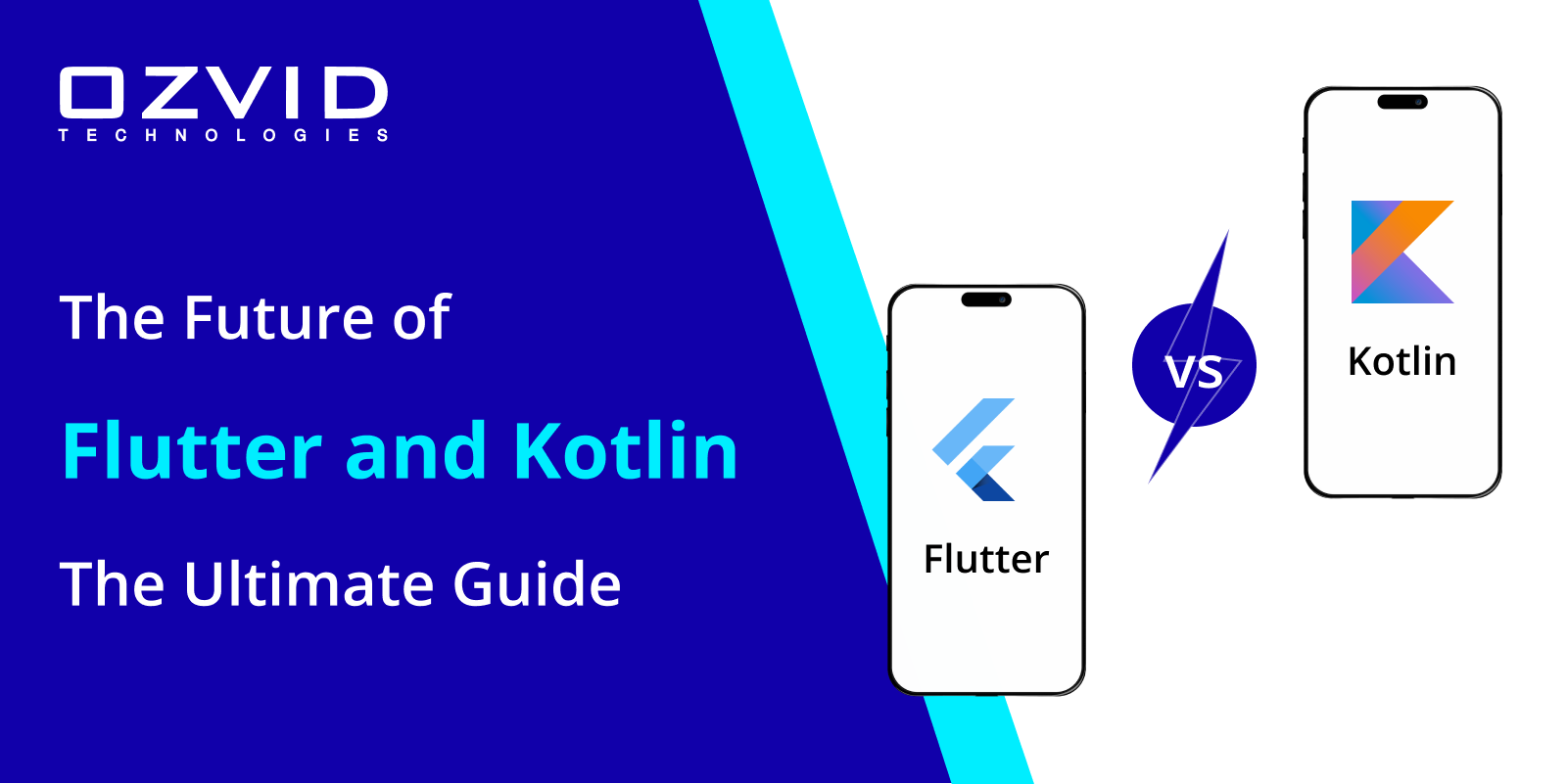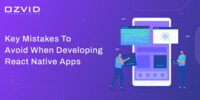- May 02, 2025
- Mobile App Development
- 11030
Share this post on:

In the rapidly evolving world of mobile app development, two frameworks have emerged as frontrunners for creating high-quality, feature-rich applications: Flutter and Kotlin. As the demand for efficient and versatile tools continues to grow, it's crucial for developers to understand the strengths, weaknesses, and future potential of these technologies. In this comprehensive guide, we'll explore the features, benefits, and future prospects of Flutter and Kotlin, helping you make an informed decision for your next project.
Key Takeaways
- Flutter offers cross-platform development, fast performance, and a rich widget library.
- Kotlin excels in native Android development with concise syntax and Java interoperability.
- Both frameworks support rapid development, scalability, and strong community support.
- Future trends include increased enterprise adoption, integration with AI and IoT, and improved performance.
- OZVID Technologies provides expert mobile app solutions using Flutter and Kotlin
Flutter: The Cross-Platform Powerhouse
Flutter, developed by Google, is an open-source UI toolkit that allows developers to create beautiful, fast, and high-performance applications. Its key features include:
1. Native Performance: Flutter uses the Dart programming language to create a native look and feel on both Android and iOS platforms. By compiling directly to native code, Flutter ensures smooth animations, fast startup times, and a responsive user interface.
2. Hot Reload: One of Flutter's most powerful features is hot reload, which enables developers to instantly see the changes they make in the code reflected in the running app. This dramatically speeds up the development process and allows for rapid experimentation.
3. Extensive Widget Library: Flutter comes with a rich set of customizable widgets that adhere to both Material Design (for Android) and Cupertino (for iOS) guidelines. This ensures a consistent and native-looking user interface across platforms.
4. Accessibility and Internationalization: Flutter prioritizes creating accessible and inclusive apps by incorporating pre-built widgets and APIs tailored to accommodate accessibility features, such as screen readers, and facilitating internationalization (i18n).
Kotlin: The Modern Android Choice
Kotlin, a general-purpose, statically typed programming language, has gained significant traction as a replacement for Java in Android app development. Its key features include:
1. Null Safety: Kotlin's null safety feature helps prevent null pointer exceptions by distinguishing between nullable and non-nullable types. The Kotlin compiler does not allow any type to have a null value at compile time, reducing the risk of app crashes caused by null references.
2. Smart Cast Function: Kotlin's smart cast function explicitly typecasts and automatically inserts immutable values into their safe cast once certain conditions are met. This often eliminates the need for explicit typecasting, simplifies the code, and improves readability.
3. Java Interoperability: One of Kotlin's significant benefits is its 100% interoperability with the Java programming language. This makes it easy for developers to leverage existing Java libraries and frameworks within Kotlin projects, enhancing code reusability.
4. Concise Syntax: Kotlin's syntax is more concise than Java's, allowing developers to write less boilerplate code and focus on the core functionality of their applications.
Benefits of Flutter and Kotlin
Both Flutter and Kotlin offer unique benefits that make them attractive choices for mobile app development.
1. Cross-Platform Development: Flutter allows developers to create high-quality applications for both Android and iOS platforms using a single codebase. This saves time, reduces development costs, and ensures a consistent user experience across devices.
2. Native Look and Feel: Both Flutter and Kotlin are designed to create native-looking applications. Flutter achieves this by compiling directly to native code, while Kotlin leverages the existing Android ecosystem and APIs.
3. Rapid Development: Flutter's hot reload feature and Kotlin's concise syntax enable developers to build and iterate on their applications quickly. This is especially beneficial for startups and small teams looking to bring their ideas to market faster.
4. Vibrant Communities: Both Flutter and Kotlin have active and growing communities that provide support, resources, and libraries. As these technologies continue to evolve, their communities are expected to expand, further enhancing their capabilities.
The Future of Flutter and Kotlin
As mobile app development continues to advance, Flutter and Kotlin are poised to play significant roles in shaping the future of the industry. Here are some key trends and predictions:
1. Increased Adoption: As more developers discover the benefits of Flutter and Kotlin, their adoption rates are expected to rise. Flutter's cross-platform capabilities and Kotlin's modern features make them attractive choices for both new and experienced developers.
2. Improved Performance: Both Flutter and Kotlin are continuously being optimized for better performance. As the underlying technologies mature, developers can expect to see even faster startup times, smoother animations, and more efficient memory usage.
3. Expanded Ecosystem: With growing communities and increased adoption, the ecosystems surrounding Flutter and Kotlin will continue to expand. Developers can expect to see more libraries, tools, and resources becoming available, making it easier to build complex and feature-rich applications.
4. Enterprise Adoption: As Flutter and Kotlin prove their capabilities in the enterprise space, more large organizations are expected to adopt these technologies. Their ability to create high-quality, maintainable applications at scale will drive their growth in the enterprise market.
5. Integration with Emerging Technologies: Flutter and Kotlin will likely integrate with emerging technologies such as artificial intelligence, augmented reality, and the Internet of Things. As these technologies become more prevalent in mobile apps, developers will need tools that can seamlessly incorporate them.
Conclusion: The Role of OZVID Technologies
OZVID Technologies, a leading Flutter app development company, is well-positioned to help organizations leverage the power of Flutter and Kotlin for their mobile app development needs. We have a team of experienced developers with a deep understanding of these technologies. Our team can help you create interactive, feature-rich applications that engage your users and drive business success.
As the future of mobile app development unfolds, Flutter and Kotlin will continue to play pivotal roles in shaping the industry. By partnering with OZVID Technologies, you can stay ahead of the curve and take advantage of these powerful frameworks to build the applications of tomorrow.
FAQ's
1. What is the difference between Flutter and Kotlin?
Flutter is a UI toolkit by Google used to build cross-platform apps from a single codebase. Kotlin, on the other hand, is a programming language mainly used for native Android app development. Flutter uses the Dart language, while Kotlin works with Java-based Android systems.
2. Which is better for app development: Flutter or Kotlin?
It depends on your app goals. Flutter is great for building apps for both Android and iOS using one codebase, which saves time and cost. Kotlin is better if you're focusing only on Android or need strong performance with deep system integration.
3. Is Flutter a good choice for future mobile app development?
Yes, Flutter is growing fast. Google and many big companies are using it to build beautiful and fast apps. With regular updates, strong community support, and cross-platform features, Flutter has a bright future in mobile app development.
4. Will Kotlin still be relevant in the coming years?
Absolutely. Kotlin is the official language for Android app development. Google fully supports it, and many developers prefer it for its simple syntax, safety, and modern features. Kotlin will continue to be a strong player in mobile development.
5. Can OZVID Technologies help me choose between Flutter and Kotlin for my app?
Yes, at OZVID Technologies, we analyze your business needs and suggest the best tech stack. Whether it's Flutter for cross-platform or Kotlin for native Android, our expert developers guide you at every step to ensure high-quality app development.










